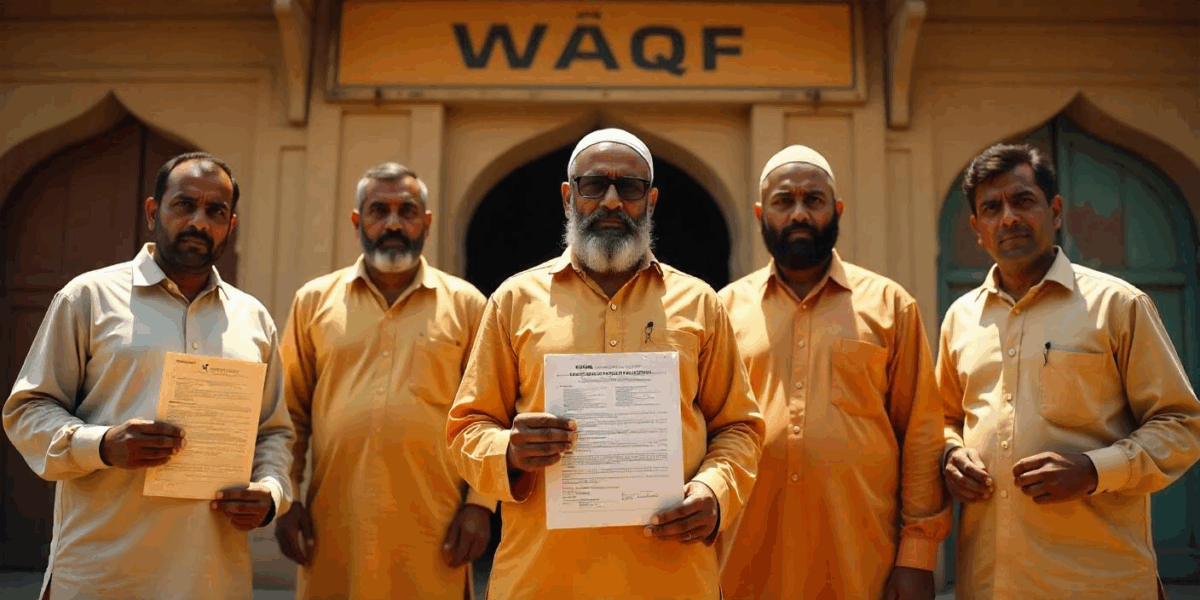It began with a simple knock, nothing dramatic, nothing that screamed scam. Just an old man named Mohammad Rafiq Ansari, walking into a police station, holding a file that had seen better days.
“Sir, they’re not who they say they are,” he told the officer at the desk. “They’ve been collecting rent for years… but they’re not trustees.”
Now imagine this: for over 17 years, across some of Ahmedabad’s prime localities, people paid rent dutifully every month.
Shopkeepers, families, and small business owners, all under the impression that their payments were going to the rightful caretakers of religious trust properties.
Except they weren’t.
What unfolded next was a classic case of old-school fraud, with a twist.
Five men allegedly pretended to be trustees of Kaanchni Masjid Trust and Shah Bada Kasam Trust, both managing waqf lands—religious endowments meant to serve the community.
They weren’t caretakers. They were actors in a play no one realized was running.
A Show Running Since 2008
Between 2008 and 2025, these men reportedly built nearly a hundred shops and houses on over 5,000 square meters of prime waqf land. Rent started flowing in, and not a rupee made its way to the trust’s official books.
What did they do instead? According to the FIR, they lined their pockets, ran this operation like it was their family property, and crafted fake documents to support their story.
It’s hard not to wonder: how does a scam like this go on for seventeen years without someone blowing the whistle?
The answer, as always, lies in silence, trust, and bureaucracy.
“Who is the trustee here?”
Rafiq once asked during a rent dispute.
“Salimbhai,” someone replied. “And what about the documents?”
“All handled. Don’t worry.”
He did worry. And unlike most people, he followed through.
His FIR cracked open a can of worms no one wanted to look into.
Because when you peel back the layers on Waqf properties, you often uncover a cocktail of fraud, fake documents, and legal ambiguity that has been normalized for decades.
Not the First Time, Not the Last
What makes this case even more important is that it’s not isolated.
Not long ago, in Rajkot, a mosque trustee and eight others were arrested for forcefully evicting shopkeepers. The excuse?
“We have an order from the Waqf Board,” they claimed. But the reality? No due process, no legal clarity, just muscle and manipulation.
And then there’s the infamous ₹1 crore bribe demand in Bharuch, where people allegedly acted on behalf of a Waqf Board CEO to threaten landowners into paying up.
You see the pattern, right? A web of power, religion, and corruption, stitched tightly under the radar, until someone brave enough steps forward.
So, What Happens Now?
The five accused in Ahmedabad, Salim Khan Pathan, Mohammad Yasar Sheikh, Mahmoodkhan Pathan, Faiz Mohammad Chobdar, and Shahid Ahmed Sheikh, are now under arrest.
The charges? Cheating, forgery, and impersonation.
Turns out, Salim Khan had already faced five criminal cases in the past, including one under the Arms Act. Not exactly trustee material, you’d think.
As the case unfolds, more skeletons may tumble out. And maybe—just maybe—we’ll see some reform in how Waqf properties are managed and audited in this country.
But let’s not kid ourselves. Scams like these aren’t rare. They thrive in the grey space between community trust and legal neglect.
Final Thoughts
This wasn’t a cyber fraud. There were no phishing links, no fake trading apps, no deepfake calls. But it was fraud of the oldest kind, identity theft, manipulation, and long-term deception.
And it worked for almost two decades.
Next time someone says scams only happen online, remind them of this case, because sometimes, the most dangerous fraudsters don’t hide behind screens.
They walk among us, smiling, collecting rent like it’s all perfectly legal.







